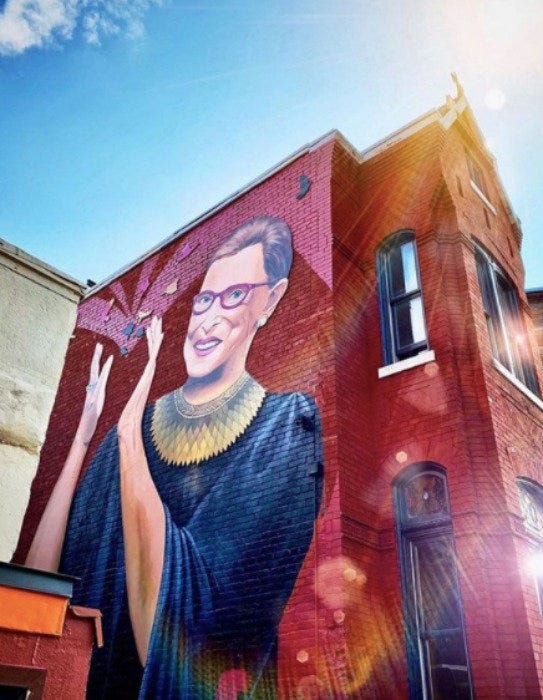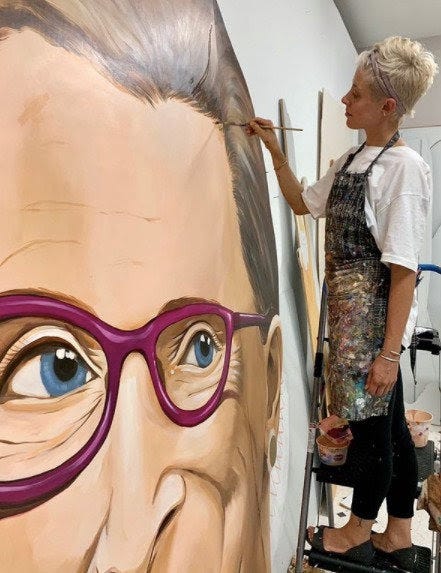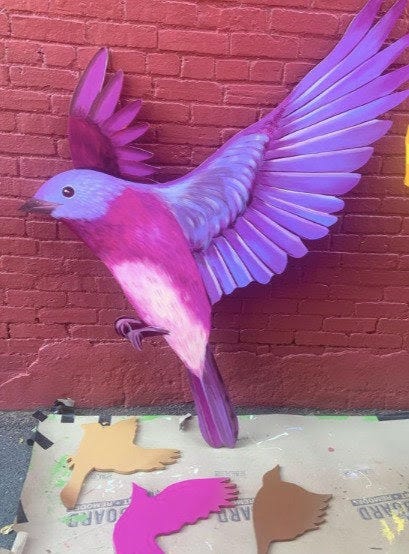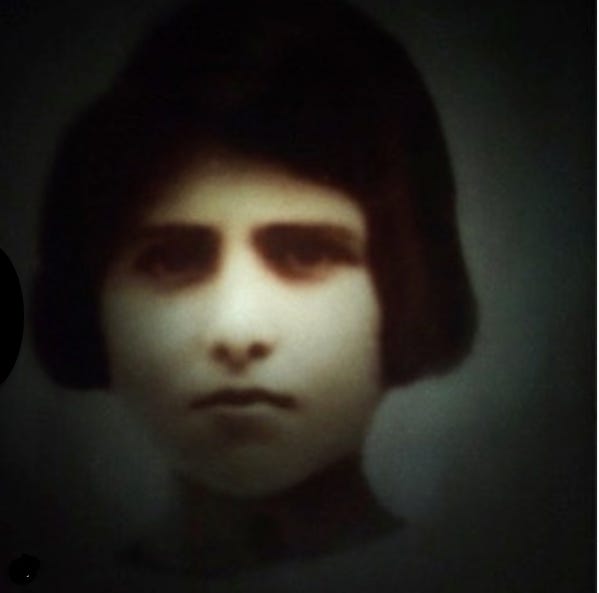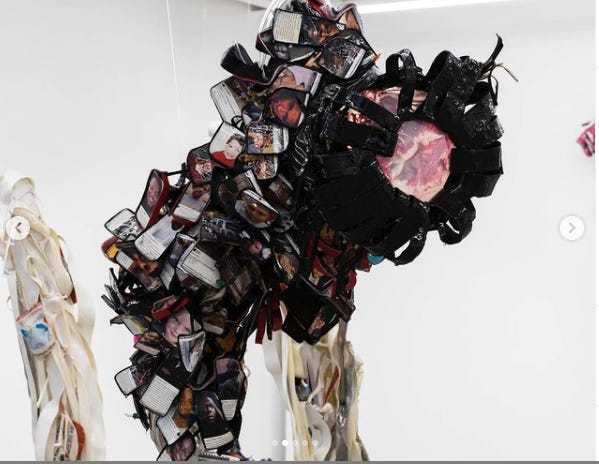ARTWRITE #4: Ruth Bader Ginsberg
Since launching ArtWrite at the end of July, I've been hoping other writers would respond to the artwork I post daily on Instagram and Facebook. Nobody bit until this past week when I posted Rose Jaffe's DC mural of Ruth Bader Ginsburg.
My mother and Kiki Bader were both smart Jewish girls named Ruth, grew up in Brooklyn in the 1930s, and attended James Madison High School. In my response to the mural, I consider what might have happened if my mother and women like her had diverged from the traditional route as RBG did. The post inspired other women to reflect on the experiences of their mothers, and I'm grateful to Nancy Deutsch Moloff and Bibi DeWan for agreeing to be the first ArtWrite followers to share their work in the newsletter.
Below, you can find images of Jaffe at work in her studio and on location. Don't scroll yet, though. To appreciate the uniqueness of Jaffe's portrait, google "RBG images" and see how many you can find in which she is smiling. You might also want to take a look at Jaffe's Instagram page to see how the mural, located just blocks away from the White House, has become a locus for mourners, and to read Jaffe's reflection on painting an icon, and the thank you note she received from RGB.
This issue includes two of my ArtWrites from the past week. I was drawn to Bea Denton images because they reminded me of the haunting photos I saw at the Hall of Names at Yad Vashem in Jerusalem. Denton is interested in exploring "ideas around faith and ritual; death, loss memory, and remembrance." While I don't usually go out of my way to learn about the artist, this statement on Denton's Instagram page led me to write about how memory might shape a couple's loss of a child.
Finally, Alicia Pillar. I’m determined to show teachers how they can use ArtWrite, so with Pillar's work, I decided to model what I thought would be a simple figurative language exercise that could be done at any level: describe the artwork using similes, metaphors, and personification. Ha. Trying to capture the complexity of a multi-dimensional installation from photographs was anything but simple. You can decide for yourself if I pulled it off. I hope you're as fascinated by Alicia's work as I am as she'll be back next week for my first interview.
Rose Jaffe
Nancy Deutsch Moloff:
Growing up, my mother always wanted to be an attorney, like her father. She was crushed when he told her that women didn't make good attorneys, and she needed to pick a different path. She then thought about journalism; she was an excellent writer. But no, her father wouldn't let her do that either. Instead, she ultimately settled for a career in a female-friendly job at Macy's in HR, with a phi beta kappa degree from NYU and a masters in organizational psychology. Her intellect was always far above the jobs she had to do.
Her brother went on to Harvard Law School and became a partner at Paul Weiss, where RBG was rejected when she applied. (They were a "Jewish" firm, so they took all the smart Jewish lawyers who wouldn't get hired at the WASPy, “white shoe” firms like Cadwallader, Wickersham & Taft, or Cravath, Swain & Moore. But being a Jewish woman was just a little too much, even for Paul Weiss, I guess).
She would have been every bit as good a lawyer as her brother, but for her gender. As for her writing skills: she always was proud that she only wrote one draft of anything she had to write at work (that was in the day when everyone wrote by hand on lined yellow legal pads, then handed it off to a secretary to be typed). Imagine if she’d been able to use her writing skills as she’d originally hoped. How much more satisfying would her career have been?
She was a few years older than RBG, but the women of that day were held back intentionally. It's one of the reasons why RBG is so very remarkable. She persevered, and she managed to overcome the many large hurdles thrown in her way, when so many other women of that generation couldn’t. And she made sure that women of later generations, and others who had faced discrimination because of who they were or whom they loved, didn’t have to face the same unwarranted challenges she and her generation had. I am grateful.
Bibi DeWan:
My own mother was also born in Brooklyn and raised there during those years. She attended Erasmus Hall High School, worked for a short time on Wall Street, then married my father. She followed him to the Midwest where he was stationed after being drafted into the army and returned to Brooklyn to give birth to me. Although she did not earn a college degree, she was an effective advocate.
When we lived near the Long Island Railroad line in the middle of Brooklyn, there was an infestation of spiders coming from the overgrown brush along the tracks. My mother and our neighbors complained, but nothing was done about it. Finally, my mother captured a spider, put it in a jar, and mailed it to the president of the railroad. Shortly after that, a crew was dispatched to clear the brush, eradicating the spider problem, and my mother was affectionately nicknamed the Spider Lady by her friends.
Unfortunately, my mother was frustrated. She carried regret and resentment about lost opportunities but did not possess the confidence to do much about it. However, she channeled her regrets into encouraging me to be an advocate for myself through many years of school, even going to the dean of my high school to successfully support my request to be placed in shop class instead of having to take a sewing class for a second time.
She continued to encourage and support me through college and law school, and no one could have had a more supportive mother after graduation. She was always ready and willing to pitch in with childcare so I could work in a world that still had little room for mothers. If only she had the same chances, encouragement, and support that I had….
Bea Denton
It had been a dozen years since Teresa died. Now that Rosetta was old enough to get married, she understood why her parents had spent those years tacitly rewriting the story of her eldest sister’s death. If Lina and Corrado didn’t cling to their inventions, they would have to face what had almost torn them apart once before.
At 19, Lina had been unable to compete with her husband’s passion for the American dream. She begged Corrado to stay in Pacentro with its narrow stone-paved alleys and the white stone of facade of Santa Maria Maggiore.
But Corrado was tired of being a laborer, a contadini. In America, he could be something bigger. With Teresa in her arms and another baby on the way, Lina conceded. What choice did she have?
Rosetta had witnessed her parents putting the fate of their marriage in memory’s supple hands. As the years unspooled, memory provided Lina and Corrado with more and more thread to embellish the stories they told about Teresa. The more they obscured the past, the easier it was for them to live in the present.
But memory stood her ground with Lina and Corrado’s youngest daughter. She understood that for Rosetta Di Mauro, survival would depend on truth and clarity.
Alicia Piller
If I could see it from above, I imagine the installation would look like a reduced human rib cage with 10 inward curving ribs instead of 24. In the photo, however, I see the jaws of a prehistoric creature ready to seize the hunk of sculpture dangling above it. The maxilla and mandible are comprised of two rows of tusk shaped sculptures that resemble men bowing in prayer. They’re studded with fang-like protrusions and wear white tattered robes made from strips of vinyl, leather, semi-inflated tubular balloons, and construction fencing. The rows of worshippers curve towards each other, meeting at an altar where two small figures regard each other like icons in a religious painting.
A hunk of sculptural meat dangles over the maw of this carnivorous chapel. One end looks like an enormous flower with black vinyl petals and a pistil made of raw, fatty flesh. The massive piece of prey is entirely covered with battered cellphones displaying actual photos of victims of violence. These phones are ironic reminders of how violent acts have become everyday events that would never be acknowledged if they weren’t recorded.
